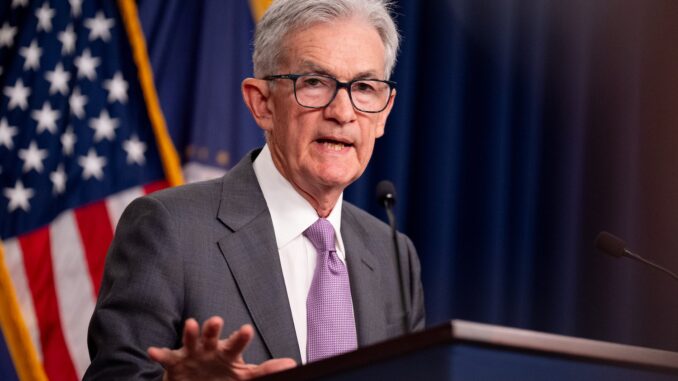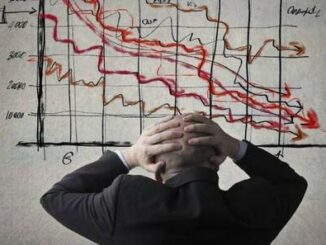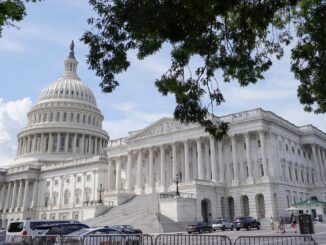
The impact will be felt around the world.
The U.S. Federal Reserve began raising interest rates several years ago to combat inflation. This week, after new data emerged about a weakened labor market and more general signs of a potential recession on the horizon in the United States, financial markets are expecting interest rates to finally begin dropping. The effects are sure to spread not only across the country but the rest of the world.
What exactly will lower interest rates mean for consumers in the United States? What have the global effects been of high rates? And what sort of political leader has Jerome Powell been?
Those are a few of the questions that came up in my recent conversation with Foreign Policy economics columnist Adam Tooze on the podcast we co-host, Ones and Tooze. What follows is an excerpt, edited for length and clarity. For the full conversation, look for Ones and Tooze wherever you get your podcasts. And check out Adam’s Substack newsletter.
Cameron Abadi: From a consumer’s perspective, how will this interest rate decision get translated into their everyday lives? Will it get easier to get a mortgage, for example, to buy a house?
Adam Tooze: So this is the question that economists call the transmission mechanism question, and that was the subject of the technical side of the Jackson Hole meeting towards the end of this summer. We discussed this issue on the way up in the tightening cycle, and it’s interesting now to be considering it on the way down. I was reflecting on the fact that I think the podcast has accompanied this entire inflation price shock period, followed by the monetary policy response. So it’s an interesting moment to look back on this. The basic message, I think, is not to expect too much too quickly. If interest rates come down by 25 basis points, that’s a quarter of 1%. There is a big margin between what the Fed charges banks through various mechanisms, which is the interest rate we’re talking about here that’s being pulled down, and the rates which banks charge to consumers. If the interest rate continues to fall, people believe that mortgage rates could fall. Well, initially, I think they’ll hover around 6% for a while before falling into the range of 4.5 to 5.5%. And that’s a relatively modest fall.
But what a very interesting paper that was discussed at Jackson Hole revealed is that in the background on the supply side of mortgages, interesting things happen when interest rates are moved by the Fed. And what was going on during the tightening phase as interest rates went up is that banks tended to sell their existing portfolios of mortgage-backed securities. They were less attractive to hold as the overall interest rate went up. And so that’s tended to amplify the effect of raising interest rates, because as you sell the mortgage-backed securities, the value of the bonds goes down. The yield that’s necessary to hold them goes up, and the entire tightening process begins to operate in the wrong direction. What you might hope for on the reverse side as the Fed lowers interest rates is that the reverse mechanism begins to kick in. And so we might see an easing of mortgage credit as interest rates nudge down that would in fact provide a powerful mechanism of support above and beyond the effect on consumers of slightly lower interest rates. So there is a mechanism there which is unraveling and may feed through to a positive shock to mortgage credit in coming months and years.
CA: If we were to take a step back and consider the global effects of this period of relatively high interest rates, what have the international effects been?
AT: Yeah, it starts with a price shock where you have a tiered global hierarchy of interest rates with the Germans paying least of all for government debt and the Americans somewhat above the Germans, unsurprisingly, given their fiscal and debt positions. And then Latin American borrowers, Asian borrowers somewhere in the middle and African borrowers at the top. And if the U.S. is paying 3 or 4%, then African borrowers might be paying 10% plus. So that’s first of all the price side. And the consequence of that, then, as those prices for emerging market and low income borrowers, the cost of borrowing, the interest rate they pay, the yield, in other words, the relationship between the price of a bond that you issue, the amount of money you raise, and the interest rate you end up paying, all of that goes in the wrong direction as the Fed raised interest rates. What happened was that debt markets shut down on a two-sided way, and they’re the ones people weren’t willing to lend because you can see that a borrower can’t really service debt to that interest rate. And borrowers decide to step out of the market.
So if you look at something like the Eurobond market, which is a market that many emerging and low income countries were tapping by issuing debt, the debt issued there collapsed over the period 2022 to 2023. This was an IMF chart recently. It collapsed by 70% relative to the pre shock period. So those low income and emerging market countries are only able to borrow $40 billion as opposed to $170 billion. Many countries actually experienced net outflows. In other words, they were paying back more in interest and principal than they were able to newly borrow. So overall, the market was sucking financial resources out of low-income countries on a very large scale. Within this sample set that the IMF was looking at, a third, 26 of 75 countries experienced net Eurobond outflows to the tune of 58 billion. And that then produces debt crisis. And debt crises are crises because they are both a debt and a financial problem. But also the politics then of debt service, the priorities of public spending and the pressure to raise taxes explode into the political arena. And from Bolivia to Kenya to Sri Lanka to Argentina to Pakistan, we have seen those kind of effects rippling through the world economy. So when we in the U.S. talk about a soft landing, we should check ourselves for a second and just consider for a moment the vast majority of humanity for whom this American interest rate hike delivered a really very, very painful blow. And it’s those countries also which were slowest to recover from COVID and have now suffered the double whammy of COVID followed by the interest rate hike driven by the price shock of COVID in the rich world. And so their recovery from Covid has been lame by comparison with the extraordinary rebound in the U.S..
CA: How could we now assess Powell as a political leader? Is he someone who has acted consciously of his political power and its possibilities—or has he been more of a conventional, thoroughly technocratic technocrat?
AT: So at a personal level, Powell is, by all accounts, charming, and his career is based on his political skills. He was brought onto the Fed by the Obama administration because he was thought to be a highly cooperative and effective player with the Republican Congressional Caucus, which was already going crazy in the 2010s in the Tea Party moment. And Powell was somebody who could explain to the Tea Party folks why it would be a terribly bad idea if American defaulted on its debt. He’s a Republican, but he was one that you could do business with. And that appears to have continued throughout his incumbency as chair. He has assiduously worked Congress. And this marks a very sharp, moving beyond the level of personalities, break with the immediate run of predecessors in the era in which we think of the Fed as this towering institution of monetary policy globally in the essentially post Bretton Woods era, in which national monetary policy becomes this key variable, which it is to a much lesser extent when you’re under a fixed exchange rate system. So since the 70s, if you think of the sequence Volcker, Greenspan, Bernanke, Yellen, these are people who are, you know, had prestige in part because of their savvy as economists.
And Powell really makes no secret of the fact that he isn’t somebody who’s an economist. He has a career in banking and private finance. And then he’s somebody who knows how to work Congress. He comes from the D.C. network. He’s that kind of insider. And I think beyond his personality and the politics of his appointment under Trump—because Trump picked him over Yellen, didn’t give Yellen a second term—I think what this signifies is something quite paradoxical or dialectical in the sense that he is acting this way and he’s suitable for the moment in part because it became obvious that very consensual elite integrating politics was essential to allow the Fed increasingly to do quite radical things when it came to economic policy. So first, in response to COVID and then in the aftermath, Powell has really normalized the era of radical interventions that began under Bernanke. You could say under Volcker with the interest rate shock, but in the form of QE under Bernanke. And when the chips were down in 2020, Powell was a really revolutionary central banker in the sense in the sheer scale of the interventions. And it’s almost as though—and I think it’s explicit in his mind—to make that kind of central banking possible, you need political integration and political backing. And that’s what he works very assiduously to deliver. So there’s, as it were, expert economists, there are technicians of monetary policy at the Fed, and he is the ambassador of the central banking system to the American political system, to Capitol Hill. And I think that in itself is the role of the central bank.
You see, there’s a degree of analogy to Christine Lagarde’s role at the ECB. I wrote a piece for Foreign Policy actually back when these things were being discussed that the emergence of these lawyer figures essentially as keys to the central banking system is a reflection of structural change, which has become more and more radical at the level of policymaking in response to a series of really dramatic shocks, and then, as it were, needs to provide itself with political legitimacy. And so you need central bankers who are good politicians.
Take the Survey at https://survey.energynewsbeat.com/






